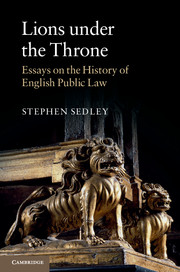Book contents
- Frontmatter
- Epigraph
- Dedication
- Contents
- Preface
- Introduction
- Part I Histories
- Part II Themes
- 6 The royal prerogative
- 7 The sovereignty of Parliament and the abuse of power
- 8 The right to be heard
- 9 The separation of powers
- 10 Public law and human rights
- 11 The state and the law
- 12 Standing and “sitting”
- 13 Law without courts: the tribunal system
- 14 The rule of law
- Index
14 - The rule of law
from Part II - Themes
Published online by Cambridge University Press: 05 November 2015
- Frontmatter
- Epigraph
- Dedication
- Contents
- Preface
- Introduction
- Part I Histories
- Part II Themes
- 6 The royal prerogative
- 7 The sovereignty of Parliament and the abuse of power
- 8 The right to be heard
- 9 The separation of powers
- 10 Public law and human rights
- 11 The state and the law
- 12 Standing and “sitting”
- 13 Law without courts: the tribunal system
- 14 The rule of law
- Index
Summary
The idea of the rule of law – in fact the expression itself – comes from Dicey. What Dicey meant by it was historically flawed and juridically incomplete. But although what it means today is still contentious, the rule of law in one form or another is a criterion of civilisation.
Dicey and the rule of law
Everybody believes in the rule of law, but few people could tell you what it means, and for everyone who could tell you, there would be two others to say they were wrong. But we at least know, or think we know, that the concept originated with Albert Venn Dicey's Introduction to the Study of the Law of the Constitution, first published in 1885.
Dicey's book was divided into three parts. The first was “The Sovereignty of Parliament”, something which Dicey took to be fundamental, total and beyond challenge. As Brian Simpson wrote:
Dicey announced that it was the law that Parliament was omnicompetent, explained what this meant, and never devoted so much as a line to fulfilling the promise he made to demonstrate that this was so.
Moreover, when some three decades later Irish home rule returned to Parliament's agenda, Dicey changed his mind about its omnipotence. In the final edition of The Law of the Constitution in 1915 he lamented that parliamentary sovereignty had fallen prey to the party system – something that political scientists both before and after Dicey's time were well aware of.
Dicey's second section was “The Rule of Law”. His third dealt, much more briefly, with constitutional conventions.
A number of features of Dicey's extensive treatment of the rule of law deserve attention. He links it with what he calls “the omnipotence or undisputed supremacy” not only of Parliament but of central government, by which he means the Crown both in and out of Parliament. The failure to distinguish between the executive and the legislative limbs of the state is of a piece with Dicey's persistent denial that Britain had, or needed, any system of administrative law. This was not simple myopia; it was driven by Dicey's xenophobic antipathy to France and to civil law systems, which he regarded as autocratic and Napoleonic.
- Type
- Chapter
- Information
- Lions under the ThroneEssays on the History of English Public Law, pp. 269 - 280Publisher: Cambridge University PressPrint publication year: 2015

